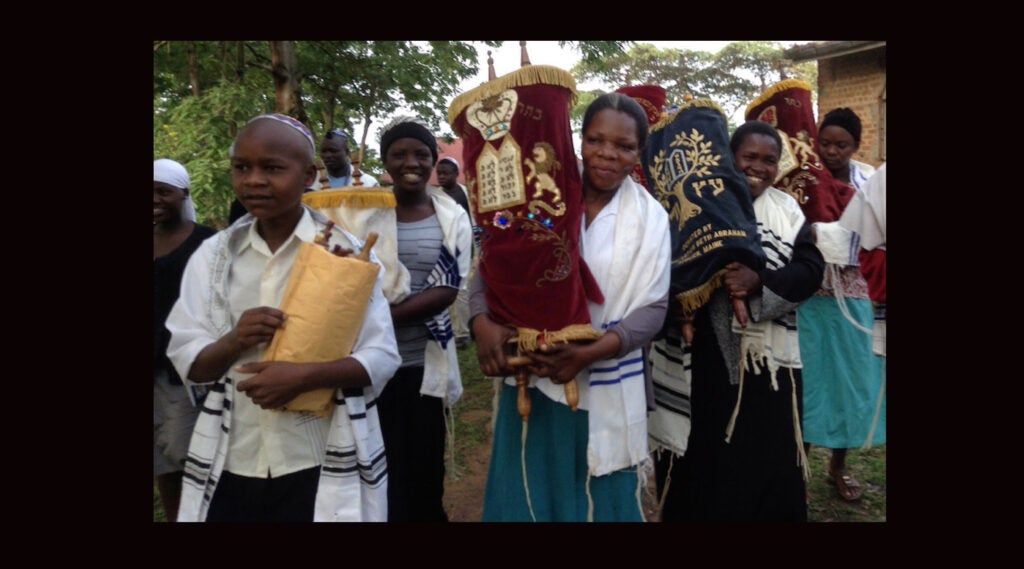Conservative Jewish leaders condemn Israel’s rejection of Ugandan Jews from immigrating
Published January 27, 2021

(JTA) — American Jews with ties to a small community of Jews in Uganda are condemning the Israeli Interior Ministry’s decision to reject the right of those Jews to immigrate to Israel.
The ministry was responding to a Supreme Court petition by Kibita Yosef, a Ugandan Jew who had requested to make aliyah.
Yosef, who converted to Judaism in 2008 under the auspices of the Conservative movement, first applied to immigrate to Israel while studying in a yeshiva there under the Law of Return. The law allows all Jews, including those who have converted, to become citizens.
But the Interior Ministry, which handles citizenship, rejected Yosef’s application, according to Haaretz. Yosef has appealed to the Supreme Court, which is expected to make its decision next week and could overrule the ministry.
The conflict could have potential consequences for Jews worldwide.
“We’re profoundly disappointed by the Interior Ministry’s decision,” said Rabbi Jacob Blumenthal, CEO of the United Synagogue of Conservative Judaism and the Rabbinical Assembly, which has a longstanding relationship with the Abayudaya Jewish community in Uganda. “We see it as a profound insult to the Conservative movement.”
The Abayudaya began practicing Judaism in 1919 after a Ugandan leader, Semei Kakungulu, declared himself a Jew and began adopting Jewish practices. In 2002, the Conservative movement began overseeing official conversions in the community.
The Ugandan community is affiliated with the Masorti Olami, the international organization representing Conservative communities worldwide, and is home to a chapter of Marom, a Conservative movement youth group. Gershom Sizomu later became the first Ugandan rabbi after his ordination at the Ziegler School of Rabbinic Studies, the Conservative movement’s seminary in Los Angeles. A woman from the community, Shoshanna Nambi, is now a rabbinical student at the Reform movement’s Hebrew Union College-Jewish Institute of Religion.
Blumenthal said he had visited the community in Uganda and seen “the vibrancy of their Jewish life” and “a deep love of Israel and the Jewish people.” The Jewish Agency, the paragovernmental organization in Israel that facilitates and encourages immigration to Israel, has recognized the Jewishness of Ugandan Jews.
But the Interior Ministry, which has the final say over matters of citizenship and is run by Aryeh Deri, head of the haredi Orthodox Shas party, has taken a different approach.
In a court document this summer, the ministry established a new policy on “emerging” Jewish communities like the Abayudaya, Haaretz reported. According to the policy, these communities would not be eligible to immigrate under the Law of Return, which says that those who convert to Judaism in a “recognized” Jewish community are eligible to immigrate.
Yosef, whose immigration status is in question, is being represented by the Israeli Religious Action Center.
The ultimate ruling in his case could have far-ranging ramifications for Jews living outside of Israel.
“Part of this is a battle for who gets to define Judaism,” said Rabbi Bradley Artson, dean of the Ziegler School of Rabbinic Studies.
The validity of conversion by non-Orthodox rabbis, and even by Orthodox rabbis who do not meet the standards of the haredi Orthodox Israeli Chief Rabbinate, has been a contentious subject for years. Converts to Judaism who move to Israel whose conversions are not recognized by the Chief Rabbinate cannot marry in Israel, for the Chief Rabbinate controls marriages. Reform and Conservative conversions performed in Israel have not been recognized for years.
While the Yosef decision may not immediately impact the potential immigration status of non-Orthodox converts in established Jewish communities, the rejection of the Ugandan community’s conversions could cast doubt on other conversions performed by those same Conservative rabbis.
“Let’s be clear that denying that the Abayudaya are authentically Jewish is on some level saying that my rabbinical school isn’t an authentic rabbinical school and it’s saying that I’m not an authentic rabbi,” said Artson, who was involved in the conversion of hundreds of Ugandan Jews.
Rabbi Jill Jacobs, executive director of T’ruah, a rabbinic human rights organization, condemned the Interior Ministry’s position on the Yosef case as “pure racism.”
“I’m very proud that the Conservative Movement, to which I belong, has forged a strong relationship w/this community, including ordaining a rabbi & fighting for community’s rights in Israel,” she wrote in a tweet. “This is pure racism on the part of the state. The High Court must do the right thing.”
Asked whether the decision had to do with race, Artson said he wasn’t sure what the “inner motivations” were of the ministry.
“But it certainly has the appearance of racism,” he said.
Blumenthal said the decision to reject Yosef’s claim would only further divide American Jews from Israel.
“It’s one more example of a wedge that the Israeli government is driving between some in Israel and the Jewish people outside Israel,” he said.














